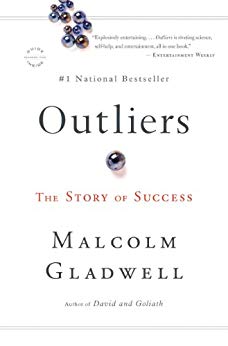

This article is an excerpt from the Shortform summary of "Outliers" by Malcolm Gladwell. Shortform has the world's best summaries of books you should be reading.
Like this article? Sign up for a free trial here .
What is Malcolm Gladwell’s Outliers about? What does this book say about success?
Outliers by Malcolm Gladwell is a collection of stories, each exploring a variety of external factors that contribute to success. Gladwell tells these stories through the lenses of various disciplines, including history, sociology, and psychology.
Keep reading to learn the basics of Outliers by Gladwell.
Outliers by Malcolm Gladwell
When we learn about someone extremely successful, we often want to know what that person is like—what gifts she was born with, what kind of personality she has, what her lifestyle is like. We assume these personal qualities are the keys to her success.
This assumption is part of the myth of the self-made man (or woman), someone who earned his successes through hard work and innate talent. We call these people outliers—their achievements are so extraordinary that they fall well outside the norm.
But in Outliers, Gladwell pokes holes in this myth. Is anyone really “self-made”? Talent and hard work are clearly important, but are they the only factors that contribute to success?
Gladwell argues that success (or failure) depends more heavily on luck than we’d like to admit. This luck comes from external factors and their hidden advantages that are often out of your control, including where and when you were born, what kind of family you were born into, how you were parented, and how much money your family has.
Let’s take a look at some of these external factors to see how they contribute to your success.
External Factor #1: When You Were Born
In Outliers, Gladwell argues that your birthday, in relation to the birthdays of your peers, may be an advantage or disadvantage, depending on the situation.
For example, children born toward the beginning of the calendar year tend to perform better academically than their younger peers who are born near the end of the year.
- If you’re older and more mature than your peers in the first grade (and have developed skills that are easier the older you are, like reading), your teachers will see you as smarter, too. You’re more likely to be funneled into gifted programs which further encourage your intellectual development.
- Over time, the initially subtle advantage of being a bit older snowballs until your academic ability is significantly higher than that of your peers.
- This age-based leveling system in schools creates a self-fulfilling prophecy: Teachers believe that older students are smarter, even if their advanced skills are due more to their stage of development than to superior intellects. Teachers believe these “smart” students have more academic potential, so they give them more attention and resources. This makes older kids truly academically superior to their peers.
Your birth year, in relation to historical events, may also provide advantages.
- For example, many of the most successful computer programmers were born in the mid-1950’s. In 1975, these individuals were the perfect age to take full advantage of the invention of the personal computer. If they had been a little older, they would have been established in their lives and careers and not as invested in understanding new technology. If they had been a little younger, their time would have been taken up with meeting high school requirements.
External Factor #2: How You Were Parented (And How Much Money Your Parents Had)
Wealthy parents tend to practice concerted cultivation, an intentional fostering of their child’s unique gifts and their (healthy) sense of entitlement. This style of parenting teaches children practical intelligence, the ability to know not only what to do, but how to do it.
- For example, kids from middle-class and wealthy families tend to self-advocate more in school than kids from poorer families. Because they’re practiced in conversing with adults, they know how to communicate in a way that gets them what they want.
In Outliers, Gladwell explains that wealthy parents can afford the time and money necessary to enroll their children in special programs, like violin lessons or after-school sports. These programs provide guidance and structure, which are useful (particularly for children) if they are to develop true mastery of a skill. Poorer families often aren’t able to provide the structure and guidance that comes with hiring a private tutor or music instructor.
External Factor #3: Cultural Legacy
In Outliers, Gladwell discusses how we inherit cultural traits that influence our success or failure. Acknowledging the weaknesses of our cultural legacy enables us to make positive changes that increase our chances at success.
For example, the safest airlines are often those from countries whose cultures do not value strict societal hierarchies.
- Plane crashes are more common in airlines from countries that value strict hierarchies. This cultural norm creates communication barriers, which prevent co-pilots from speaking up and challenging the authority of the pilot. This is a problem if the co-pilot notices that something is wrong, but can’t communicate this effectively to the pilot.
- Korean Air addressed a pattern of plane crashes resulting from culturally-driven communication difficulties by changing their language of communication and training subordinates to take a more active and assertive role in their position.
External Factor #4: Hidden Opportunities
Sometimes, what appear to be disadvantages are actually opportunities.
For example, discrimination forced Jewish lawyers to develop a unique skill set. They became experts in the type of law that the elite firms wouldn’t touch: litigation. When litigation became a more acceptable practice in the 1970’s, these lawyers were already well-seasoned in their craft.
Nature vs Nurture
In Outliers, Gladwell explains that these external factors can dramatically impact your opportunities for success. Talent and other innate qualities contribute to success, but only up to a point. This is known as the threshold effect.
For example, IQ is a useful metric for predicting success up until an IQ of about 120. After the threshold of 130, other factors become more significant, such as divergent thinking, the ability to think of multiple options and scenarios.
Talent is important, but talent alone can only take you so far. We need to be able to develop our talent, and while our work ethic may be part of our personalities, it is also influenced by our cultural legacy.
Additionally, the time to achieve true mastery of a skill (Gladwell popularized the now-ubiquitous 10,000-hour practice benchmark) is only available to you if you come from a family and community that give you this opportunity.
What to Do with All This?
By understanding that external factors greatly influence success, we can intentionally create a world where more people are given opportunities to use and develop their gifts. For example, we might:
- Keep children out of gifted programs before age ten, when the advantage of having a birthday near the beginning of the academic year starts to weaken. This gives the younger kids in each grade a chance to “catch up” in maturity with their older classmates.
- Extend the length of the school day and school year, letting children from disadvantaged communities keep up with their more privileged peers.
- Set up a lottery admissions system for elite colleges and universities that gives any student with “good enough” grades and test scores a chance at admission.
- Acknowledge and address the weaknesses of our cultural traditions, as did Korean Air when it trained its copilots to be assertive rather than deferential when pointing out a problem, even though deference to authority is a significant part of Korean culture.
Such changes could create a world where outliers—the extraordinarily successful—cease to be outliers at all. Everyone could be more successful in a world in which we acknowledge that successes aren’t self-made and that our environments influence what we’re able to achieve.
———End of Preview———

Like what you just read? Read the rest of the world's best summary of "Outliers" at Shortform . Learn the book's critical concepts in 20 minutes or less .
Here's what you'll find in our full Outliers summary :
- What makes some people outliers, and most others not
- Why some genius outliers end up failing in life
- Why Asians are good at math, and other curiosities of culture






